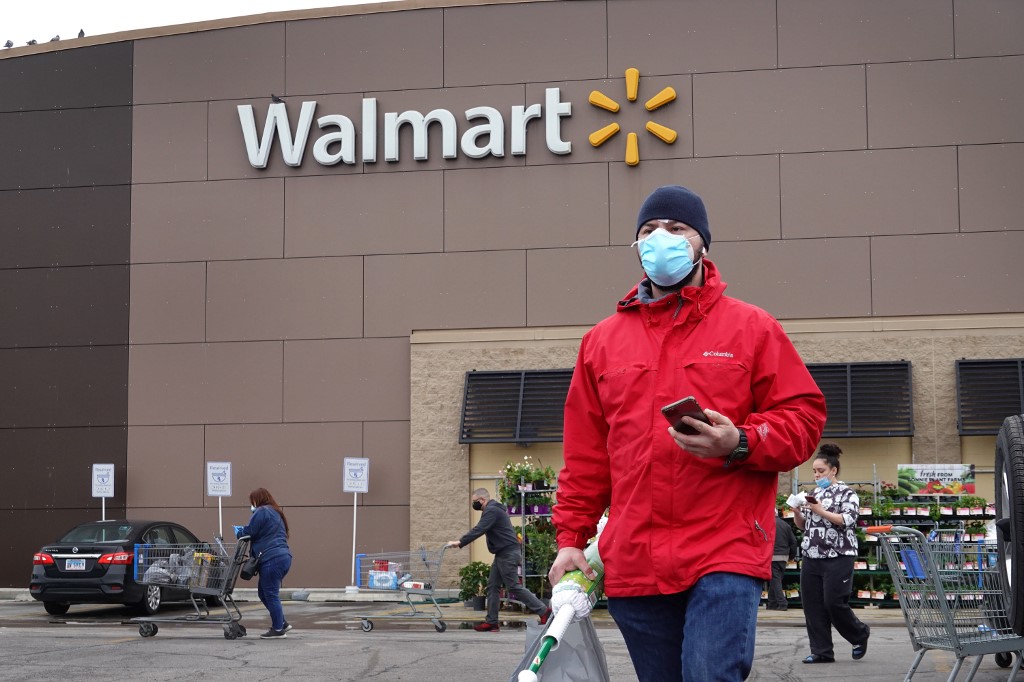Booming demand for groceries and essential items lifted Walmart’s first-quarter profits, even as the company struggled during the coronavirus crisis to replenish key items like toilet paper and cleaning supplies, the company said on Tuesday.
“Our supply chain is amongst the most capable in the world, but in this environment we have stretched it,” said Walmart CEO Doug McMillon, who estimated that US inventories were down about 8% at the end of the period.
“Job number one in the US is to get back in stock,” McMillon said on a conference call with analysts.
Walmart’s e-commerce business surged a staggering 74% in the quarter ending April 30, with home-bound customers opting for grocery delivery at home or for click-and-pickup options at stores.
This included an influx of new customers drawn to Walmart’s broad product slate, many of whom have become repeat customers, executives said.
The results topped analyst expectations despite higher costs connected to the Covid-19 crisis such as bonuses for hourly workers and extra money for store cleaning.
Run on bandanas, sewing machines
Profits rose 3.9% to $4.0 billion on an 8.6% increase in revenues to $134.6 billion.
Walmart hired 235,000 workers during the quarter in the United States, the majority on a temporary basis to boost its stores and supply chain, McMillon said.
Walmart said the Covid-19 crisis led to $900 million in additional costs, including spending to equip staff with safety masks and sneeze guards at checkout stations and to launch or expand programs such as curbside pickup and mail-to-home service for pharmacy sales.
Chief Financial Officer Brett Biggs expects the spending to be comparable in the second quarter, saying “there’s going to be some expenses that carry on probably for some time.”
Some items such as cleaning supplies are still below targeted levels, although the company has replenished in some categories, executives said.
Prices for meat also have increased due to the temporary shutdown of some US slaughterhouses, although that pressure may ease as the plants are brought back on line.
After the initial run on household staples, Walmart saw consumers throng to sometimes unlikely items that have taken off in the social distancing era.
These include adult bicycles for parents to accompany kids on rides; bandanas and sewing machines for homespun face masks; and supplies for working at home, such as office chairs and laptops.
Meanwhile, the company announced it was discontinuing Jet.com, which it acquired in 2016 as part of the effort to build up the chain’s online business. The move reflects the “continued strength of the Walmart.com brand,” the retailer said.
The retail giant joined the large number of publicly-traded companies to withdraw its annual profit forecast, citing “significant uncertainty” on the duration of the Covid-19 crisis, its effect on consumer confidence and the cadence and duration of government emergency payments to consumers.
Neil Saunders, managing director of GlobalData Retail, said the results compared favourably to those of rival Amazon, which also experienced huge revenue growth, but was hit more significantly by higher costs connected to Covid-19.
“That Walmart has outperformed Amazon, at least in growth terms, underlines both the deficiencies of Amazon in grocery – which generated the bulk of sales this quarter – and Walmart’s growing power in the segment,” Saunders said.
“Having a wide range of fulfilment options, including delivery to home, collection from store – and by using stores for fulfilment – allowed Walmart to ramp up capacity in a way that many other players struggled to do.”
After opening higher, the company’s share price finished 2% lower at $124.95.
AFP
























